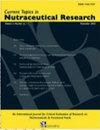12周富氢水摄入对超重成人身体组成、短链脂肪酸转换和脑代谢的影响:一项随机对照试验
IF 0.4
4区 医学
Q4 NUTRITION & DIETETICS
Current Topics in Nutraceutical Research
Pub Date : 2023-07-07
DOI:10.37290/ctnr2641-452x.21:235-241
引用次数: 0
摘要
这项随机对照试验的目的是分析中期补充富氢水对超重成年人大脑代谢、食欲调节激素、身体成分和安全生物标志物的影响。20名(n=20,10名女性)体重指数>24.9 kg/m2的明显健康成年人被分配接受每天0.5升的富氢水(7.5毫克氢气)或无氢水(自来水),为期12周。重复测量的双向方差分析显示,两种干预措施在几个身体成分指标上存在显著差异(P≤0.05),富氢水比安慰剂更能将腰围和中上臂围分别减少1.31厘米(95%置信区间,从-0.23到2.85)和0.65厘米(95%可信区间,从-0.10到1.40),分别地富氢水在提高血清胃饥饿素水平方面优于安慰剂,因为与安慰剂组的平均差异为17.28 pmol/L(95%置信区间,从1.81到32.75)(P=0.02)。据报道,富氢水比安慰剂在提高血清总短链脂肪酸水平方面有一个不显著的强阳性趋势(P=0.010),与对照组的平均差异为195.6μmol/L(95%置信区间,从-64.55到275.85)。富氢水干预19.7μg/mg(95%置信间隔,从0.31到39.09)后,平均粪便钙卫蛋白水平显著降低(P=0.03),但需要通过代谢和营养障碍的多中心纵向随机对照试验进行进一步验证。本文章由计算机程序翻译,如有差异,请以英文原文为准。
The Effects of 12-Week Hydrogen-Rich Water Intake on Body Composition, Short-Chain Fatty Acids Turnover, and Brain Metabolism in Overweight Adults: A Randomized Controlled Trial
The aim of this randomized controlled trial was to analyze the effects of medium-term supplementation with hydrogen-rich water on brain metabolism, appetite-regulating hormones, body composition, and safety biomarkers in overweight adults. Twenty (n = 20, 10 females) apparently healthy adults with a body mass index >24.9 kg/m2 were assigned to receive 0.5 L per day of hydrogen-rich water (7.5 mg of hydrogen) or hydrogen-free water (tap water) for 12 weeks. Two-way analysis of variance with repeated measures revealed a significant difference between the two interventions in several body composition indices (P ≤ 0.05), with hydrogen-rich water superior to placebo to reduce waist circumference and mid-upper arm circumference by 1.31 cm (95% confidence interval, from –0.23 to 2.85) and 0.65 cm (95% confidence interval, from –0.10 to 1.40), respectively. Hydrogen-rich water outcompeted placebo to raise serum ghrelin levels, as the mean difference from the placebo group was 17.28 pmol/L (95% confidence interval, from 1.81 to 32.75) (P = 0.02). A non-significant strong positive trend (P = 0.10) was reported toward hydrogen-rich water being superior to placebo in augmenting total serum short-chain fatty acid levels, with a mean difference from the control group of 195.6 μmol/L (95% confidence interval, from –64.55 to 275.85). The mean fecal calprotectin levels were significantly reduced after hydrogen-rich water intervention for 19.7 μg/mg (95% confidence interval, from 0.31 to 39.09) (P = 0.03). Our findings advance hydrogen-rich water as a promising metabolic intervention in overweight adults, but further validation via multicentric longitudinal randomized controlled trials in metabolic and nutritional disorders is required.
求助全文
通过发布文献求助,成功后即可免费获取论文全文。
去求助
来源期刊
CiteScore
1.10
自引率
0.00%
发文量
36
审稿时长
>12 weeks
期刊介绍:
Current Topics in Nutraceutical Research is an international, interdisciplinary broad-based peer reviewed scientific journal for critical evaluation of research on chemistry, biology and therapeutic applications of nutraceuticals and functional foods. The major goal of this journal is to provide peer reviewed unbiased scientific data to the decision makers in the nutraceutical and food industry to help make informed choices about development of new products.
To this end, the journal will publish two types of review articles. First, a review of preclinical research data coming largely from animal, cell culture and other experimental models. Such data will provide basis for future product development and/or human research initiatives. Second, a critical evaluation of current human experimental data to help market and deliver the product for medically proven use. This journal will also serve as a forum for nutritionists, internists, neurologists, psychiatrists, and all those interested in preventive medicine.
The common denominator of all of the topic to be covered by the journal must include nutraceuticals and/functional food. The following is an example of some specific areas that may be of interest to the journal. i) Role of vitamins, minerals, antioxidants and phytonutrients on cardiovascular health, cancer, diabetes, ocular health, mental health, men’s health, women’s health, infant nutrition, ii) Role of herbals on human health, iii) Dietary supplements and sleep, iv) Components of diet that may have beneficial effect on human health, v) regulation of apoptosis and cell viability, vi) Isolation and characterization of bioactive components from functional foods, vii) Nutritional genomics, and viii) Nutritional proteomics.

 求助内容:
求助内容: 应助结果提醒方式:
应助结果提醒方式:


